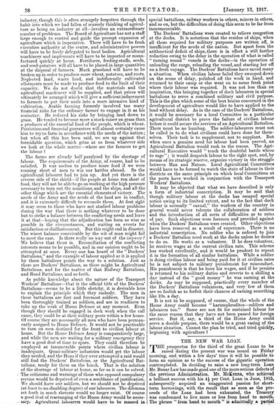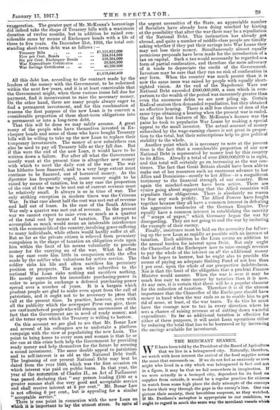THE NEW WAR LOAN. THE 4 prospectus for the third of
the great Loans to be raised during the present war was issued on Friday morning, and within a few days' time it will be possible to form an opinion as to the success of the gigantic operation contemplated. In deciding to raise a new long-term Loan Mr. Bonar Law has made good one of the more serious defects of the previous Administration. Mr. McKenna, who achieved a brilliant success with his 41 per Cent. Loan in June, 1915, subsequently acquired an exaggerated passion for short- term borrowings, with the result that as soon as the pro- ceeds of the Loan had been exhausted, the Treasury was condemned to live more or less from hand to mouth. The phrase " from hand to mouth " is admitteilly a partial exaggeration. The greater part of Mr. McKenna's borrowings did indeed take the shape of Treasury bills with a maximum duration of twelve months, but in addition he raised con- siderable sums by means of Exchequer bonds with a life of three to five years. On December 31st, 1916, the total out- standing short-term debt was as follows All this debt has, according to the contract made by the lenders of the money with the Government, to be redeemed within the next few years, and it is at least conceivable that the Government might, when these various items fall due for payment, find it inconvenient to raise the necessary money. On the other hand, there are many people always eager to find a permanent investment, and for this combination of reasons the first purpose of the new Loan is to convert a considerable proportion of these short-term obligations into a permanent or into a long-term debt. That this will be done we may safely assume. A great many of the people who have themselves invested in Ex- chequer bonds and some of those who have bought Treasury bills will be willing to take up the new Loan to replace their temporary investments. The money of new subscribers can also be used to pay off Treasury bills as they fall due. But if this were the end of the new Loan, it would have to be written down a failure. For after all what the Government mostly want at the present time is altogether new money with which to meet the daily cost of the war. The war has hitherto been financed, and to a very large extent must continue to be financed, out of borrowed money. As the Spectator has frequently urged, more money ought to be raised by means of taxation, but in any case the proportion of the cost of the war to be met out of current revenue must be relatively small. It always is so in time of war. The only striking exception in modern times was the Crimean War. In that case about half the cost was met out of revenue and half out of loans. In the case of the South African War only a quarter was met out of revenue. In the present war we cannot expect to raise even so much as a quarter of the total cost by means of taxation. The attempt to accomplish so much would mean an intolerable interference with the economic life of the country, involving grave suffering to many individuals, while others would hardly suffer at all. But so far as the private citizen is relieved from pecuniary compulsion in the shape of taxation an obligation rests upon him within the limit of his means voluntarily to provide money for the carrying on of the war. What he offers in any case costs him little in comparison with the offer made by the soldier who volunteers for active service. The soldier risks his life and often sacrifices his pecuniary position or prospects. The man who subscribes to the national War Loan risks nothing and sacrifices nothing. He merely surrenders his immediate purchasing-power in order to acquire in exchange a deferred purchasing-power spread over a number of years. It is a bargain which prudent people are glad to make even apart from the call of patriotism, and it ought not to be necessary to press that call at the present time. In practice, however, even with all the publicity which the newspaper Press can give, there are vast numbers of people who will remain unconscious of the fact that the Government are in need of ready money, and of the terms upon which the Treasury is willing to borrow. On this account we are glad to see that Mr. Bonar Law and several of his colleagues are to undertake a platform campaign with the view of popularizing the new Loan. The point to bring home to every man and woman is that he or she can at this crisis both help the Government by providing ready money and help themselves for the future by securing a sound investment. The same double appeal to patriotism and to self-interest is as old as the National Debt itself.
The beginning of our present National Debt may best be dated from the year 1660, which was the first occasion on which interest was paid on public loans. In that year, the year of the restoration of Charles II., an Act of Parliament was passed_ declaring that " any person lending £100 or a greater summe shall doe very good and acceptable service and shall receive interest at 6 per cent." Mr. Bonar Law is not offering 6 per cent., but is appealing for a similar " acceptable service.". There is One point in connexion with the new Loan on which it is important to lay the utmost stress. in spits of
Treasury Bills ..
£1,1155,815,000
Five per Cent. Bonds ..
• •
334,514,569 Six per Cent. Exchequer Bonds
•••
159,204,000 War Expenditure Certificates ..
• •
29,856,900 War Savings Certificates ..
••
40,250,000
£1,679,640,469
the urgent necessities of the State, an appreciable number of Socialists have already been doing mischief by hinting at the possibility that after the war there may be a repudiation of the National Debt. This insinuation has already got abroad, and quite a number of middle-class people are timidly asking whether if they put their savings into War Loans they may not lose their money. Simultaneously almost equally pernicious proposals have been made for the introduction of a tax on capital. Such a tax would necessarily be regarded as a. form of partial confiscation, and therefore the mere advocacy of it tends to depreciate the credit of the Government.
Investors may be sure that they run no risk of confiscation in any form. When the country was much poorer than it is now the same issue was raised by people with equally short- sighted vision. At the end of the Napoleonic Wars our National Debt exceeded £800,000,000, a sum which in com- parison to the wealth of the period was immensely greater than even the enormous debts we are now piling up. Certain Radical orators then demanded repudiation, but they obtained no effective hearing. There is still less chance of men of the same type obtaining a hearing when the present war is ended. One of the best features of Mr. McKenna's finance was the pains he took to popularize War Loans by making a special appeal to the small investor. The actual amount of money subscribed by the wage-earning classes is not great in propor- tion to the total, but their subscriptions help to give political stability to the whole.
Another point which it is necessary to note at the present time is the fact that a considerable proportion of our new National Debt is represented by money lent by this country to its Allies. Already a total of over £800,000,000 is in sight, and this total will certainly go on increasing as the war con- tinues. The fact that Great Britain should have been able to make out of her resources such an enormous advance to her Allies and Dominions—mostly to her Allies—is a magnificent testimony to the financial strength of our country. Here again the mischief-makers have been active. There are cynics going about suggesting that the Allied countries will repudiate their obligations. There is absolutely no reason to fear any such perfidy. The Allied Powers have fought together because they all have a common interest in defeating the aggressive tendencies of the German Empire. They equally have a common interest in establishing the sanctity of " scraps of paper," which Germany began the war by disregarding. They are not going to end the war by imitating the example of their enemy. Finally, insistence must be laid on the necessity for fol!ow- ing up the new Loan as rapidly as possible with an increase of taxation. Each addition to the Loan means an addition to the annual burden for interest upon Debt. Not only ought the Chancellor of the Exchequer now to raise enough revenue to pay the whole of the interest on all the additional money that he hopes to borrow, but he ought also to provide the means of paying an adequate Sinking Fund of not less than 1 per cent. upon the whole of our prospective indebtedness. Nor is that the limit of the obligation that a prudent Finance Minister would assume. When the war is over it may be much less easy to raise money by taxation than it is now. At any rate, it is certain that there will be a popular clamour for the reduction of taxation. Therefore it is of the utmost importance that the Chancellor of the Exchequer should have money in hand when the war ends so as to enable him to get rid of some, at least, of the war taxes. To do this he must have the courage now to tax in every direction where he seen a chance of raising revenue or of cutting down wasteful expenditure. ' So far as additional taxation is effective for either of these purposes, it will assist Loan operations either by reducing the total that has to be borrowed or by increasing the savings available for investment.



























 Previous page
Previous page